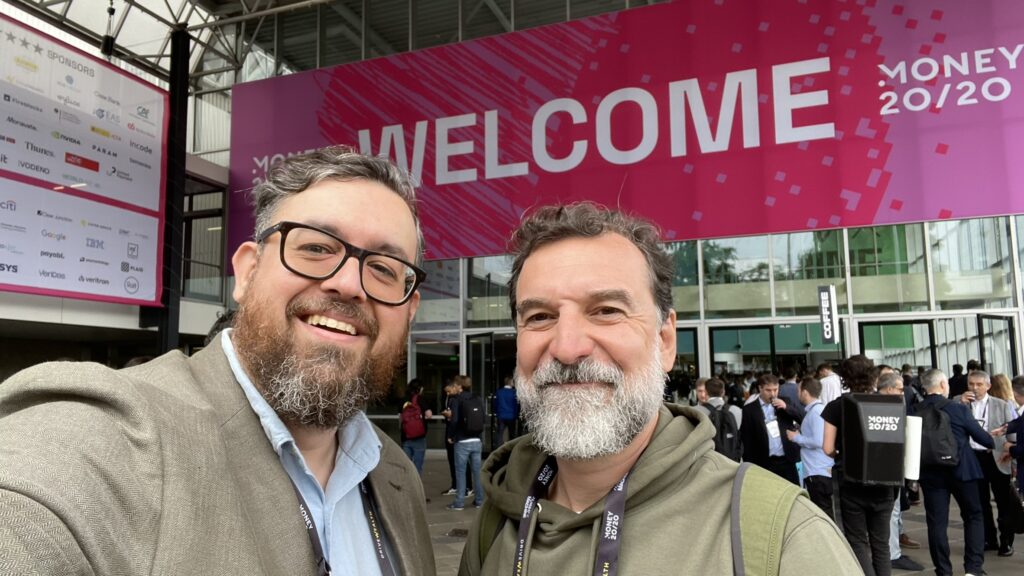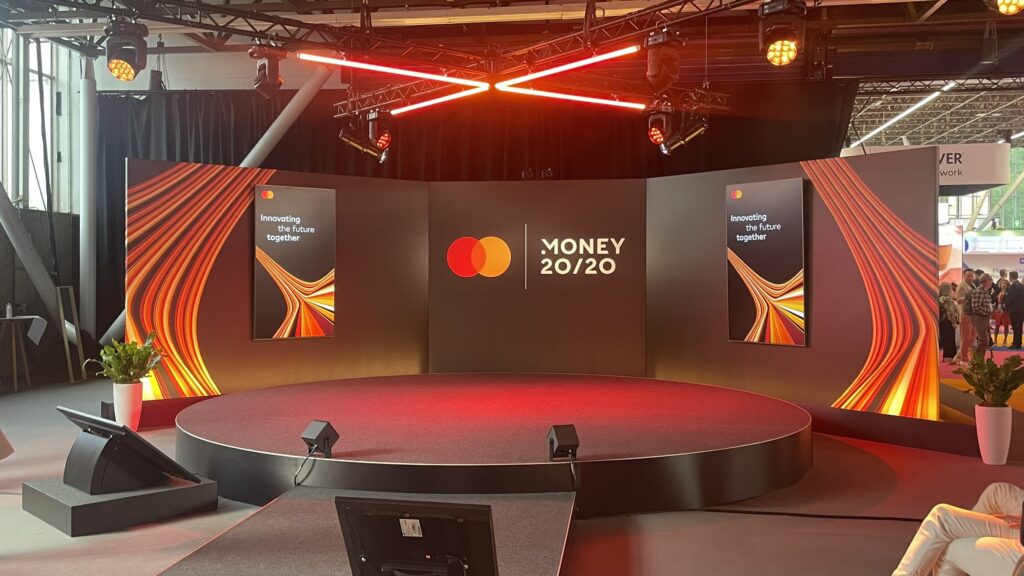A few weeks ago, Devengo participated in Money 20/20, arguably the largest fintech-oriented event in Europe. The agenda spans three full days, the venue is massive, and the amount of potential networking to do makes it one of the most exhausting event experiences I’ve had. Let me share some of the insights I got from the event.
Money 20/20: A hotspot for fintechs
Money 20/20 is THE reference event for all of us working in the payments industry, and it shows. Every relevant European player in the industry is represented here…, and there is a strong vibe of “you HAVE to be here if you want to make it.”
It is a pricey event to attend (with individual tickets in the thousands of euros and booths in the tens of thousands of euros range, plus the cost of accommodation in Amsterdam, a very expensive city). The production complexity of an event like this, in terms of logistics, stage design, video, and lighting, is huge. Although some details could be improved -the food and the conference layout come to my mind- the production quality is in general good.
Attending an event like this becomes a humbling experience. The sheer number of companies operating in the payments space, each carving out its niche, is both inspiring and daunting. Inspiring because you can really see how many opportunities there are as banking infrastructure providers, but it may feel daunting too because it’s massively evident how much overlap exists between you and other companies and the urgent need to differentiate.
Sometimes, it takes a moment to decipher what a company truly does when it claims to “make payments” or specialise in “instant payments”. While pitches often sound similar—take “instant cross-border payments,” for example—the reality of their implementations can be drastically different. The devil, as they say, is in the details.

Cross-Border Payments & AI Everywhere
While artificial intelligence, particularly in the realms of fraud detection and compliance, remains a hot topic, the conversation frequently shifted to cross-border payments at Money 20/20.
This reflects the current zeitgeist, where the need for seamless international transactions is more pressing than ever. Companies and regulators alike are grappling with how to streamline these processes to make them as efficient and secure as possible. Devengo is, of course, closely following advances in the European standard in this field, such as the new OCT scheme.
EU Regulatory Perspectives
European regulators were a significant presence at the event, with numerous talks centred around upcoming major initiatives. Two key focal points were the digital euro and the EU data hub. These discussions aimed to establish clear expectations and guidelines, setting the stage for future developments in the fintech space.
Focus on networking
Money 20/20 is mostly aimed at infrastructure and solutions providers, and most of the businesses I saw were focused on partnership and alliance creation and not so much on sales. This is an event by fintechs for fintechs. In fact, there was little presence of merchants in the talks or, from what I gather from looking at the passing badges, in the audience.
There was, however, a notable exception in a talk where companies like Just Eat, Lastminute.com, and Kingfisher (a massive company that was previously unknown to me) took the stage to share their perspectives. Kingfisher, a British retail giant with an annual turnover of £12 billion, provided some thought-provoking insights. They highlighted the potential of account-to-account (A2A) and real-time payments (RTP) in the context of high-value in-store sales. For instance, purchasing a £4,000 kitchen often exceeds the credit limit of many consumers’ cards. Additionally, Kingfisher noted that they handle over £1 billion in cash transactions annually, many of which could be replaced by A2A payments, reducing the burden of cash management.

The Differentiation Dilemma
A recurring theme among the myriad of VC conversations we had was the challenge of differentiation. The most complex question to answer is, arguably, “What sets your strategy or company apart from the others?” While other inquiries may have objective answers that align (or not) with the VC strategy (growth stage, verticals, etc.), defining a competitive advantage is more nuanced and subjective. Companies must continually ask themselves this question to stay ahead.
Knowledge Gaps in the Payments Ecosystem
One surprising revelation was the knowledge gap within the fintech community itself. Even among an audience of Europe’s leading payments specialists, there is a lack of understanding of fundamental concepts like SCT-Inst (SEPA Instant Credit Transfer) and OCT (Original Credit Transfer).
This was starkly illustrated when a prominent player in AML/fraud spent a significant portion of their presentation explaining the basics of SCT-Inst, a 24/7 instant payment system with a transaction limit of €100,000 as if it were a novel concept (when the scheme was put in production in 2017!).
In an industry like payments, where changes, regulations, and new schemes/standards appear constantly, it is very difficult to stay up to date. Education and content publication can lead to relevant inbound opportunities.
Conclusion
Money 20/20 profoundly reminded us of the payments industry’s dynamic and complex nature. It underscored the importance of continuous learning and adaptation, whether it’s understanding regulatory shifts, leveraging AI for compliance, or exploring new payment methods like A2A and RTP.
As the landscape evolves, so too must the strategies and knowledge of those within it, ensuring they remain at the cutting edge of innovation and service delivery.
Will see you next year, Money 20/20!
